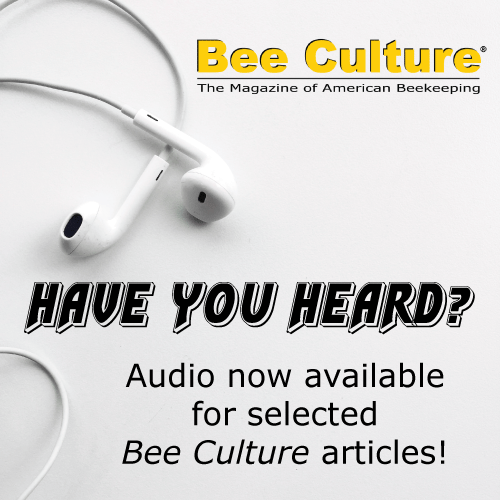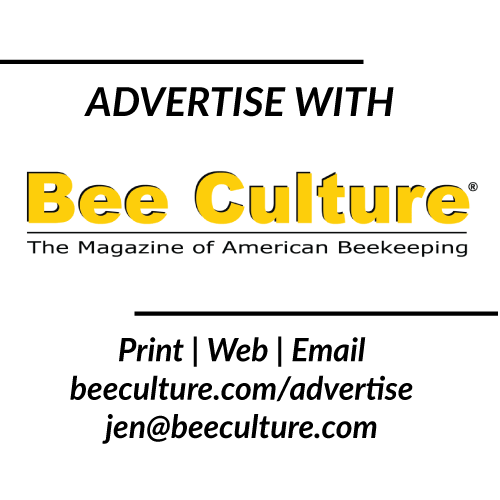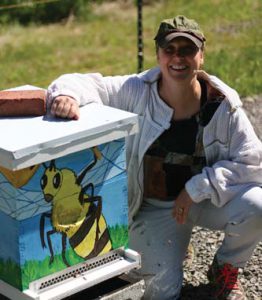
Dr. Tracy Farone
State Apiarists and Veterinarians
By: Dr. Tracy Farone
Over the holidays, I had the opportunity to reach out to several State Apiarists to discuss ways they believe veterinarians could help to serve honey bees and the beekeeping industry. Joan Mahoney, the State Apiculturist for the New York’s Department of Agriculture; Barbara Bloetscher, State Apiarist for the Ohio Department of Agriculture; and Kim Skyrm, Chief Apiary Inspector for the State of Massachusetts’s Department of Agricultural Resources (with contribution help from the entire MA Bee team: Paul Tessier, Shay Willette and Jessica Glover) all graciously agreed to share their thoughts on the matter. I asked a few basic questions, but we also touched on a few more sensitive subjects. I was excited to listen to what they had to say, give my two ears and (mostly) keep my mouth shut for a month.
Q1. Are there any existing collaborations between state apiculturists and veterinarians in your State in the care and treatment of honey bees?
Joan – Yes, when beekeepers request antibiotics to treat non-symptomatic colonies exposed to American Foulbrood (AFB), the New York State Department of Agriculture and Markets refers them to veterinarians who are able to provide the necessary prescription.
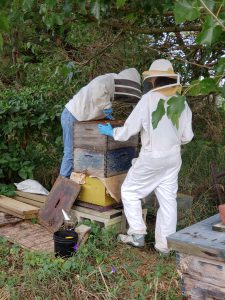
Barb and Hailey (vet student) inspecting. Photo credit: Barb Bloetscher
Barb – The Ohio State University College of Veterinary Medicine has invited me and The Ohio State University State Apiculturist to give talks to the veterinary students who are interested in the apiary program. Both undergraduate and veterinary students have invited us to speak to their clubs and participate in the OSU Food Animal Medicine Student Symposium Hands-On Workshop- Wet lab they have in early Spring. I have also spoken at the Midwest Veterinary Conference on honey bee diseases. OSU offers an externship for graduating veterinary students to experience areas of interest. Thanks to one persistent student, the OSU Apiculturist and I have “shared” one or two students each season three different years. The intern works with the Apiculturist on different studies and spends a day or two with me in the field, inspecting colonies. They have all commented on how much they appreciated the opportunity.
Kim – Yes! Apiarists or Apiary Inspectors visit beekeepers to perform health inspections of honey bee colonies and used equipment. If during an inspection, the inspector discovers visual symptoms of European Foulbrood (EFB), then a sample is taken from the colony and sent to the lab for analysis. Inspectors provide a report of the findings from the inspection and the lab provides results for the sample directly to the beekeeper. If lab analysis confirms the presence of EFB, then inspectors recommend treatment using an antibiotic. To obtain the antibiotic, inspectors instruct the beekeeper to contact a local veterinarian and provide the documentation received from the inspection including the report and lab analysis. The veterinarian then meets with the beekeeper and establishes a veterinary-client-patient relationship (VCPR) and issues a prescription for the antibiotic to the beekeeper. The inspector and the veterinarian follow up with the beekeeper to ensure the medication was successful and EFB controlled. As part of their role, Apiary Inspectors must ensure compliance for the treatment and management of contagious or infectious diseases and EFB is typically listed as a regulated disease.
One area we feel has expedited this process is that we supply beekeepers with free sample kits that provide the materials and instructions they need to take samples for EFB/AFB, Varroa mites/Nosema from their colonies and send directly to labs for analysis. This has really sped up disease detection and diagnostic services in our state. We started this component of our program services in 2018 and it has been so well received and popular in our state that we have given out over 3,000 of these to date for beekeeper use. In addition to supporting our program in finding incidences of health issues, it has also allowed veterinarians to get quick lab analysis for samples to enable them to respond faster when needed.
Q2. What services from veterinarians could be of the most assistance to State Apiculturists? To beekeepers/the beekeeping industry? Could you use some help BEYOND providing VFDs and prescriptions for three antibiotics?
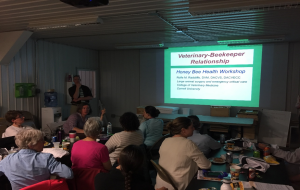
Veterinarian beekeeper talk at Betterbee in NY. Photo credit: Joan Mahoney
Joan – With the development of vaccines for AFB and RNAi treatments for varroa mites on the horizon, greater veterinary involvement will be beneficial to beekeepers.
Barb – It would be very helpful for beekeeping organizations such as ABF, AHPA, HBHC and all State and local beekeeping associations to have a vet on their board and as a speaker every year. We would like veterinarians to explain their role in prescribing VFD’s for bees and the reasons that the FDA is taking this role more seriously. The Honey Bee Veterinary Consortium provides names of veterinarians who work with beekeepers, but I don’t think it is widely known. In addition, every vet school should invite bee knowledgeable veterinarians to share ideas and solutions.
I have witnessed beekeepers spend several hours teaching a veterinarian basic beekeeping knowledge only to have the veterinarian charge him for the vet’s time. Seems like it should be the other way around! I think beekeepers and the veterinarians need to understand each other’s perspectives so that we can work together better.
Kim – Our biggest challenge is finding veterinarians who can assist beekeepers in accessing the antibiotics necessary for the treatment of EFB. There are only a few veterinarians who are aware of the existence of apiary programs and the prescription needs for beekeepers. My suggestion is that if you are an interested veterinarian, please advertise your willingness to be of service to the beekeeping community by contacting local bee groups and sharing your information with them as well as on the “Find a Bee Vet” listing on the Honey Bee Veterinary Consortium website. We have been lucky in Massachusetts to have a few veterinarians who have been willing to take on this role and “bee” diligent about responding quickly to beekeeper needs and providing support, but we have a lot of beekeepers, and these wonderful veterinarians could use additional support too!
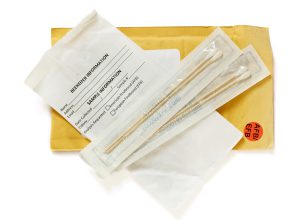
AFB/EFB kits Kim Skyrm provides to beekeepers to take samples. Photo courtesy of Kim Skyrm.
Q3. Beyond possible antibiotic treatment for AFB and EFB, do you think it is important for veterinarians to have a solid understanding of honey bee management, biology, nutrition and pathology to serve these animals and beekeepers?
Joan – Yes, in New York, we recognize that veterinarians should understand honey bee health and have been working to educate and train veterinarians. Dr. Scott McArt, PhD, from Cornell University and Dr. Christopher Cripps, DMV from Betterbee have been working together, along with Drs. Robin and Rolfe Radcliffe, DMV and Dr. David Peck, PhD, to hold workshops aimed at giving our veterinarians a solid understanding of honey bee management and diseases. Additionally, Cornell has added curriculum in their College of Veterinary Medicine to ensure that honey bees are part of veterinary training.
Barb – Yes, I see the need for veterinarians to show beekeepers why prophylactic use of antibiotics hurts the honey bee industry by weakening the bees and spreading disease to other apiaries. Some State Apiary Inspection Programs do not receive the support needed to stop the spread of AFB and EFB. If the veterinarians can also guide beekeepers toward proper use of antibiotics and to burn, when necessary, it would help support the state programs.
Kim – We do not recommend antibiotic treatment for AFB – this pathogen is too virulent and pathogenic to be treated – infected colonies should be destroyed. Honey bees are no different from any other managed animal in that they require care; therefore, veterinarians are uniquely suited to partner with beekeepers to provide support. It is imperative that veterinarians have a working knowledge of honey bee management, biology, nutrition and pathology to best assist these amazing organisms and the beekeepers who manage them for pleasure and profit. I have always found both beekeepers and veterinarians to bee as (com)passionate and fascinated with the art and science of beekeeping as well as intent to ensure bee health and sustainability of the population.
Q4. In some States, honey bees and State Apiculturists are housed in the Plant Division or Bureau of the Department of Agriculture. Do you think there could be any benefit for honey bees to be classified as animals (by State governments)? Could this realignment bring more attention, recognized status and possible funding to honey bees as an agricultural animal or would that cause too many bureaucratic issues?
Joan – In New York we have explored this. After the recent retirement of our director of the Division of Animal Industry and a new incoming director, we discussed the move but thought it best to continue to house honey bee work in the Division of Plant Industry. The New York State Department of Agriculture and Markets is a small agency, so communication between divisions is continuous.
Barb – Oh boy, I don’t think I know enough of the politics to answer this, but honey bees are livestock, and are maintained as livestock. Maintaining healthy colonies is crucial for agriculture so perhaps the beekeeping industry would be taken more seriously and receive funding from multiple sources. Through time, these programs evolve and move around. No doubt when the apiary programs were first developed, the plant industry was mostly agricultural and the bees are the means to achieve a yield, so being in the plant division made sense.
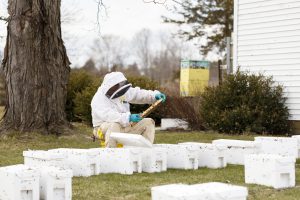
Kim Skyrm inspecting nucs. Photo courtesy of Kim Skyrm
Kim – You may have heard the recent California ruling that bees are now classified as “animals” (i.e., fish). In short, yes, for some states/territories there are many benefits to classifying bees and insects under the umbrella of “animal”. The need for this depends on the language in each state/territory legislature. Ultimately, the root of this question is about support. Honey bees, beekeepers who manage them and veterinarians who provide support would all benefit if Apiary Programs across the country were more adequately funded with a sustainable budget and full-time staff. This would not only allow for better services to beekeepers but also a team of folks working together (including veterinarians) who are focused on honey bee health full time, year-round. Getting the word out about the vital role of Apiary Programs and the services they provide is hard given that budgets are never static, and bees should always be considered a top priority. Honey bees and beekeepers deserve attention now and, in the future!
Q5. Do you think there is a way to correct, modernize and update honey bee diseases’ focuses to realize the current and actual threat level of all diseases in honey bees to create more support in staff and funding? (i.e., CCD and AFB playing a lesser overall role with Varroa, viruses, nutrition, Nosema, etc. gaining larger and additional attention).
Joan – Yes. This year in New York State, we saw a decrease in AFB; however, varroa mite losses, coupled with viruses and drought conditions, are expected to lead to many more colony losses than AFB. We need to focus on beekeeper education and continued development of queens with resistant, hygienic traits. Such traits have been shown to reduce varroa levels and virus levels, as well as AFB infections.
Barb – Education is the key. We need to teach and emphasize the best strategy to solve beekeeping problems and lead people to the best resources so that they are less tempted to “go fishing” online. Beekeepers don’t consider varroa mites to be the serious vector that it is. We may consider AFB to be serious, but since “everyone” has varroa, it is just a problem that constantly hinders our success. As long as 40% of our colonies are dying every year, it is obvious that varroa needs to be monitored all season and treated with labeled products as needed. Varroa control should be a priority in colony management.
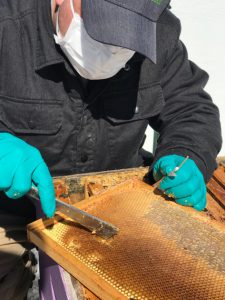
Kim Skyrm taking samples of deadout. Photo courtesy of Kim Skyrm
Kim – Knowledge and exposure is key. No other entity inspects more honey bee colonies, visits more beekeepers, submits more lab samples or communicates with the beekeeping community than Apiary Inspectors. Keep in mind that many of the major honey bee health issues were also initially discovered by Apiary Inspectors or collaborators working closely with these entities. Given this, I always say if you want to know about honey bee health in your area, talk with an Apiary Inspector. “My” responses were a whole hive effort from the entire MA Bee team: Paul Tessier, Shay Willette and Jessica Glover!
Q6. How would you like to see apiculturists and veterinarians work together to serve beekeepers in the future. What do you think is ideal… possible… and practical?
Joan – Apiculturists and veterinarians should keep lines of communication open and provide each other with regular updates. Apiary inspectors should continue conducting inspections with veterinarians serving as a resource and providing guidance and medical services as needed.
Barb – I think the first step is to communicate more. I would like to have veterinarians attend beekeeping meetings and speak, or at least have a booth to answer questions.
The perception is that veterinarians have not been taught the importance of managed honey bees. Mammal livestock and poultry have been considered the important “animal” livestock and where the money is. Honey bees were seen as a production agriculture input and not as a vitally important industry. Beekeepers do not promote themselves well as livestock managers but if you think about it, beekeepers make up for losses by making splits. You can’t do that with animals. If growers lost 40% of their herd, we would all be in serious trouble, yet statistics show that beekeepers continue to lose 40% of their colonies every year. This is not a sustainable practice. We don’t get ahead, we just stay “even”.
The comments I have heard from hobby, sideliner and big commercial beekeepers is that beekeepers have been their own “veterinarians” since the beginning of beekeeping. They have “done everything a veterinarian would do” (with the help of USDA, Universities and dumb luck). “Why do ‘we’ need a real veterinarian when we know more than they do?” We need to communicate this issue so that both parties understand how we can work together to improve beekeeping biosecurity. Honey bees have the potential to be flying pest/pathogen carriers as colonies are moved around the state and the country. We all have the same goal – to maintain healthy colonies. Beekeepers need to be able to recognize serious bee diseases, as do veterinarians. We need to know when to use antibiotics and when to burn.
The beekeeping industry needs to be universally recognized as being critical to pollinating our food supply. With veterinarians assisting with maintaining strong colonies and stressing the importance of using them to produce optimal crop yield, I think organizations and growers will realize how much we depend on the beekeeping industry.
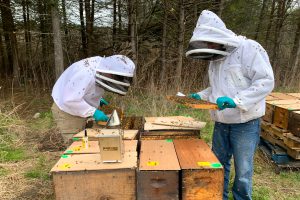
Shay Willette and David Saleh inspecting nucs. Photo courtesy of Kim Skyrm.
Kim – Ideally, every state/territory would have a fully funded and staffed Apiary Program. Apiary Inspectors would provide inspection services and lab analysis for beekeepers and collaborate with veterinarians to ensure honey bee health is maintained regarding the use of antibiotics. Every state/territory would have a list of several eager veterinarians who have advertised their availability and willingness to provide services to the beekeeping community. Veterinarians would work collaboratively with apiarists to monitor honey bee health, support beekeepers real time and follow up to ensure that recommendations and treatments were successful.
Possibly and practically, apiarists would inspect beekeepers and provide recommendations and veterinarians would assist with prescription and treatment plans. It’s fairly simple in the need and execution of these roles but could be complex in the ability of states/territories to direct funding and visibility to ensure these groups are able to collaborate and provide service.
I appreciate these knowledgeable folks sharing their input and experiences! Thanks Kim, Joan and Barb! For me, they are largely preaching to the choir, and I can happily say that in the last five years, I have personally witnessed positive strides in many of the concerns they bring up. However, we still have some things to figure out, improvements to be made and some time to pass to appreciate current investments. I believe this is a conversation that will continue to develop into the future. Like most things, it’s all about developing positive relationships and accomplishing common goals.
A Couple of Resources:
List of State Apiarists: https://www.blueskybeesupply.com/state-apiarists/ Accessed 12/28/22.
Apiary Inspectors of America (AIA) https://apiaryinspectors.org/


